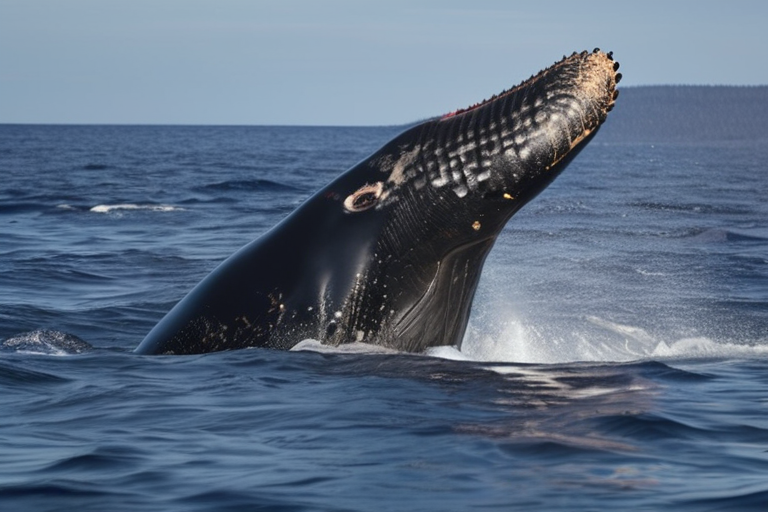Scientists Say North Atlantic Right Whale Population Slowly Increasing
A North Atlantic right whale swims through the waters off New England on May 25, 2024. (Noaa via AP)
The North Atlantic right whale population has shown a slow but steady increase in recent years, according to scientists who study these majestic creatures. The latest estimate puts their numbers at 384, up eight from last year and more than 70 from the low point of 312 in 2020.
"This is a welcome development for our team," said Dr. Barbara Block, a marine biologist with Stanford University and member of the North Atlantic Right Whale Consortium. "We've been working tirelessly to protect these whales from ship strikes and entanglement in fishing gear, and it's heartening to see some progress."
The North Atlantic right whale was once hunted nearly to extinction, but conservation efforts have helped stabilize their population. However, they remain vulnerable to human activities that threaten their survival.
"Their numbers are still critically low," said Dr. Block. "We need to continue our efforts to protect them from ship strikes and entanglement in fishing gear."
The whales' decline over the past decade was precipitous, with their numbers falling by about 25% between 2010 and 2020. But since then, they have shown a trend of slow population growth.
"We're seeing some encouraging signs," said Dr. Block. "But we need to be cautious not to get too optimistic. We still have a long way to go before these whales are safe."
The North Atlantic Right Whale Consortium has been working with fishermen, ship owners, and government agencies to develop measures to reduce the impact of human activities on the whales.
"We're making progress," said Dr. Block. "But we need to continue our efforts to protect these incredible animals."
Background:
The North Atlantic right whale is one of the rarest whales in the world, with only a few hundred individuals remaining. They are found in the waters off New England and Canada, where they feed on tiny crustaceans and plankton.
Conservation Efforts:
The North Atlantic Right Whale Consortium has been working to protect these whales since 2010. The consortium includes scientists, fishermen, ship owners, and government agencies from several countries.
Additional Perspectives:
"I'm thrilled to see the numbers going up," said Sarah Schleifer, a whale conservationist with the Ocean Conservancy. "But we need to keep pushing for more protection for these amazing animals."
"We're making progress, but it's slow," said Captain John Smith, a fisherman who has worked with the consortium to develop measures to reduce ship strikes on whales. "We need to continue our efforts to protect these incredible creatures."
Current Status and Next Developments:
The North Atlantic right whale population is still critically low, but their numbers are slowly increasing. The consortium will continue its efforts to protect these whales from human activities that threaten their survival.
"We're not out of the woods yet," said Dr. Block. "But we're making progress, and that's something to be proud of."
*Reporting by Theguardian.*







